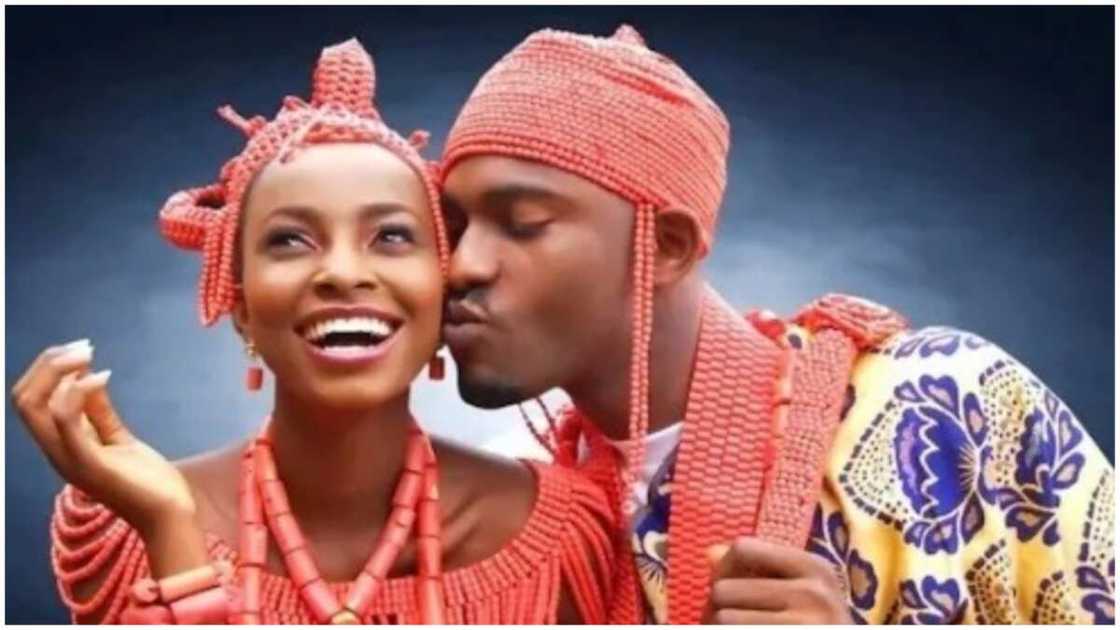Interesting facts about the Ijaw traditional marriage ceremony
With over 500 languages and over 300 tribes in Nigeria, one may be prone to think that these groups may have little or no unique qualities to them. Well, that is entirely incorrect as the beauty of Nigerian cultures is often projected through their uniqueness.
Today's focus however, will be on the one amongst the largest tribes in Nigeria; the Ijaw people. The ethnic group make up some of the ethnic groups found in some states like Ondo, Lagos, Bayelsa, Rivers and Delta state.
Due to the fact that they live along these coastlines, their customs and traditions are usually centered on festivals, meals, burial rites and marriage ceremonies. As is the norm in Nigeria where marriage is not just about the coming together of two people but their families as well, the Ijaw people however have certain customs that aren't just unique but can be considered borderline bizarre for some people.
READ ALSO: Personal letter from the Editor-in-Chief of Legit.ng (former NAIJ.com)

Source: UGC
The Ijaw people just like most cultures in Nigeria often have introduction ceremonies in which the groom and his family officially introduce themselves to the bride and her family. In the Ijaw culture, this is known as Ware ogiga gbolo which when translated means to knock; although the suitor must have initially visited the parents of the bride to inform them of his intentions, upon which he would be given a date to come for the introduction along with the list of things he would come with.
He is expected to come with some quantity of local gin, alcohol and other beverages. If the groom is not an Ijaw man, he could be allowed to come with kola nuts as it is generally not a tradition for the Ijaws to break kola nut for prayers.
READ ALSO: Popular 'yahoo yahoo' kingpin who's a married father of two arrested in Calabar
After the introduction, a proper date is set for the traditional marriage proper to be discussed by the spokespersons from both families.Regardless of this, the wedding date is usually influenced by the intending couple.
A list is then given to the groom containing what he is required to bring for the traditional marriage rite. This is where it gets interesting. Many Nigerian traditional wedding requirements often contains things like food stuff. With the Ijaw people, it is different.
Except for salt, what is usually found on the list is 20 litres of gin, a canoe and fishing nets, lantern, mortar and pestle, box of clothes, money for parents of the bride, tobacco, money for the maidens, attire for the parents, money for the bride’s waist and money for the brothers.
It appears for this people, teaching one how to source for food is better than just giving one food.
READ ALSO: Actress Tonto Dikeh debunks reports claiming she cannot marry an Igbo man
On the day of marriage, friends and well wishers are invited to witness the grand ceremony. The bride’s family would first of all ensure the requirements on the list have been fulfilled. As usual, before the bride is presented to the family of the groom, other maidens are presented to be sure the groom knows his bride. Once she has been identified, the gifts would be accepted and the bride and groom would be blessed in the traditional way.
Another interesting thing to note about the Ijaw traditional ceremony is how the groom is made to spend money. It has been reported that during the wedding ceremony, an Ijaw bride is not expected to smile until she has been sprayed a lot of money by the groom and his family.
The Ijaw tribe is definitely a beautifully unique culture!
Meanwhile, the Fulani ethnic group, found in the northern region of Nigeria, are one of the dominant ethnic groups in Nigeria alongside the Yoruba, Hausa and Igbo groups. Like every culture in Nigeria, they have customs and traditions that guide their everyday living.
One of the aspects of the culture is the Sharo festival held in the Fulani communities twice a year. Sharo; which literally means flogging, is a festival for the rite of passage from boyhood to manhood. The young Fulani boys test their strength and endurance by getting flogged. Shocking as it may, it is a festival that is quite cherished and celebrated.
HELLO! NAIJ.com (naija.ng) upgrades to Legit.ng We keep evolving to serve our readers better.
Igbo ora, the home of Twins | Legit TV
Source: Legit.ng

